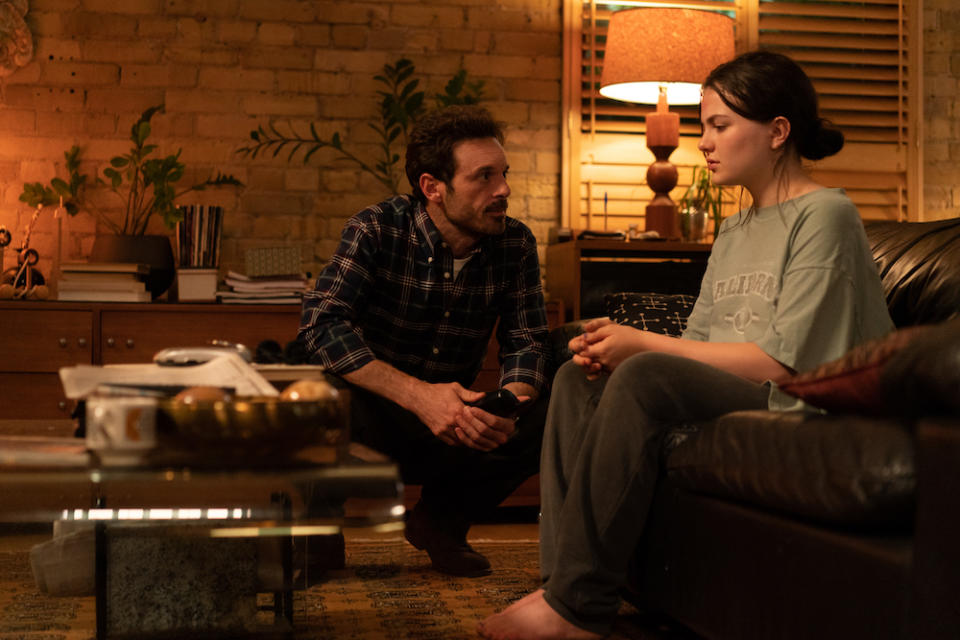‘Luckiest Girl Alive’ Author Jessica Knoll Defends Film Against Trigger Warning Backlash, Explains Book-to-Screen Changes

SPOILER ALERT: This story contains spoilers for “Luckiest Girl Alive,” now streaming on Netflix.
In 2015, Jessica Knoll’s “Luckiest Girl Alive” was the book in everyone’s bag. It spent 17 consecutive weeks on the New York Times Best Sellers list. Before Hello Sunshine — or Reese Witherspoon’s book club — even existed, Witherspoon signed on to produce a film adaptation.
More from Variety
'The Crown' Season 5 Trailer: Princess Diana Fights Back Against a Royal Family in Crisis
Netflix Gives Second Season to Australia's 'Heartbreak High'
It took seven years, but ultimately, the movie landed at Netflix. First set to have a theatrical release, the Mike Barker-directed movie, written by Knoll, took off the moment it dropped. Currently, it’s in its second week in the No. 1 slot on the streaming service: 57 million hours of the movie have been watched this week alone.
Still, the release hasn’t been without a bit of backlash on social media. The story follows Ani FaNelli — played by Mila Kunis as an adult, and Chiara Aurelia as a teenager — when she’s forced to face the traumatic incidents of her past as she prepares to participate in a documentary, and the film includes three very graphic rape scenes and a school shooting. It’s rated R for “violent content, rape and sexual material,” and Netflix mentions “sexual violence” and “threat” in its disclaimer.
Still, though many are applauding the film for covering important issues, others on Twitter have asked why a stronger trigger warning wasn’t placed on the film.

“We’ve done a lot to be sensitive about all of the very sensitive issues that are in the film,” says Knoll, who based the book on her own personal traumas. “I am a little surprised by it, honestly, because there’s so much violence against women in a lot of things out there right now. I just don’t see people in an uproar about that. We’ve gone to all these lengths in all these other ways, and I’m happy to do it. I want there to be resources for people. I want people to be prepared going in, so yeah, it’s a little surprising.”
Knoll also notes that the screenplay specifically changed a major plot point for this reason: While the book doesn’t reveal the story of the school shooting until closer to the end, it’s mentioned very early in the film to prepare the viewer.
In Variety‘s interview, Knoll goes into further detail about how “Luckiest Girl Alive” was made, and explains the reasoning behind the changes made in the adaptation.
This took seven years to adapt. Why do you think now was the right time for the movie to be released?
We don’t always have the luxury of choosing! I think it’s a matter of when it came together, not necessarily a conscious choice, but I do think that there’s something interesting about the fact that it did come together when it did. It did take seven years, a move to a streamer, Mila Kunis reading it. All of that happened a couple years post-#MeToo and seeing that women were interested in hearing about these stories, and seeing themselves in these kinds of stories in particular.
I’m a better writer now than I was seven years ago. I understand this character and this story and this trauma in particular a whole lot better than I did seven years ago — which I also think gives you the power to get in even deeper with these characters. So I think all of that is a blessing in its own way.
Let’s talk about some of the changes from the book to the movie. Ani’s relationship with her teacher, Mr. Larson (Scoot McNairy), was borderline inappropriate in the book. In the film, it was not. How and why did that change happen?
That’s one of the things that we had to let go from the book that really killed me. In a movie, you just have so much less real estate to develop things. To be able to adequately develop that dynamic between them, which is inappropriate in the book, to get at the why, and for her to have the realization about the why and how that feeds into everything — her choice to come forward her story, her choice to not go forward with her marriage — we just didn’t have time for it. It was about streamlining the story and less about it being a question of, do we want to 86 this because it’s inappropriate? It was less to do with that, and more choosing to focus on developing other storylines, other parts of her psyche and helping all of that build us to the ending that we’re at.
The other thing is, in the book, he really does serve to show that he’s a buffer to [Ani’s fiancé] Luke. In the film, we wanted Ani to come to certain realizations on her own, and not have him be the one to say, “You’re marrying the wrong person.” When we tried that in the script, it felt like it was like taking away some of Ani’s power if he was the one to say that, and she didn’t discover it on her own.

In that same respect, I feel like the movie revealed a lot more of Dean (Alex Barone) and his life than we saw in the book.
That was more so that when they do have their confrontation together at the end, you want to feel invested in it. And you’re not going to feel invested in it if you don’t see him or talk about him throughout the film — in the present day — leading up to that moment. I think that also speaks for how you have to do things in a visual medium versus in a book. You need those constant visual reminders of this person and his presence in her current life in order to really make that pay off in the end, when they meet face to face.
The character of Luke (Finn Wittrock) also seems different in the movie. I hated him in the book, but in the movie, you almost feel for him. Was that the intention?
I think we wanted there are always to be a question. You want to buy at the very beginning that she kind of has this perfect life. That includes this impending marriage to this “great guy,” that it is a real relationship based on love and that the dissolution of it is not because he’s a bad guy: It’s because she doesn’t know who she is at all. She’s like, once I figure out who that is, I don’t know if this is gonna be the relationship that feels good to me, but I don’t even know who I am. How can I be in a real, authentic relationship without knowing that? Again, it becomes less about, I’m leaving you because you’re awful and more about her saying, I’m leaving you because it’s about me. Those were constant conversations we were having, about how we want her to make these decisions and have these realizations all about her, not just, cut this guy loose because he’s such a jerk.
It was interesting because toward the end of the movie, I thought they may actually stay together.
We wanted to play with the audience there too. Like, maybe that is her happy ending where they do get married. Then they have the breakup scene, and he’s still not as awful as in the book, but she still has to consider that, “If I marry this person, he has a distaste in his mouth about how I need to talk about this and deal with this. That’s fair if that’s how he feels about things, but I will not be able to process what happened to me if I feel that it’s bringing him discomfort.”

I know you’re off Twitter now, but there has been a bit of backlash about not having a bigger trigger warning at the top for sexual violence, the school shooting and her binge eating. Is that something you’ve heard about?
We talked about it extensively. In the end, we gave it the strong rating that it has. It doesn’t just say “sexual violence,” it says “rape.” We made the decision to include that word in it. In the script, we decided to reveal in the first act that she was part of a school shooting, which is not the way it is in the book. That also gives people ample time to be like, “Oh, there’s school shooting in this? It’s not for me.” We also include a resource card at the end. If you follow that, there’s a roundtable I did with a psychiatrist, a moderator from RAINN and also with Chiara Aurelia, one of our actresses.
We’ve done a lot to be sensitive about all of the very sensitive issues that are in the film. I am a little surprised by it, honestly, because there’s so much violence against women in a lot of things out there right now. I just don’t see people in an uproar about that. We’ve gone to all these lengths in all these other ways, and I’m happy to do it. I want there to be resources for people. I want people to be prepared going in, so yeah, it’s a little surprising.
I still have social media, but not Twitter. Everything I’m seeing on Instagram and TikTok, all the messages and the comments that I’m getting are all like, “Thank you so much for sharing this,” or “This made me realize that things are unprocessed for me.” So, I’m not hearing any of it personally, which also just makes me think is just kind of a conversation that’s happening with a minority of people on Twitter.
This is such a personal story for you. Ultimately, was there anything you were able to include in the book, but for some reason or another, you weren’t able to in the movie?
It was really difficult with the flashbacks. I do wish that we could have spent a little bit more time with TifAni [Aurelia] and Arthur [Thomas Barbusca]. I think that they have such a such a complex relationship, and we have to move so quickly from her being accepted by the in-crowd, to the ostracization that happens and then going back to Arthur and Ben [David Webster]. I wouldn’t want to make the movie any longer than it is — I think it’s the exact right amount of time. I just wish, through some sort of time machine or wrinkle in time, we could fold in one or two extra scenes between TifAni and Arthur.
This interview has been edited and condensed.
Best of Variety
The Best Pop Culture Halloween Costumes for 2022: From 'House of the Dragon' to 'Euphoria'
Constance Wu Gets Candid in Revealing New Memoir 'Making a Scene'
Sign up for Variety’s Newsletter. For the latest news, follow us on Facebook, Twitter, and Instagram.

 Yahoo News
Yahoo News 
